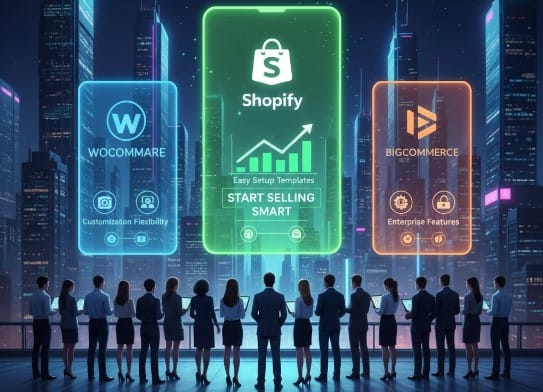Introduction: Start Selling Smart in 2025
Starting an online store in 2025 doesn’t have to be overwhelming. With the right e-commerce platform, even beginners can launch, manage, and grow a professional store with minimal technical skills. The challenge isn’t just picking a platform—it’s picking the right platform that fits your business goals, budget, and growth plans.
In this guide, we’ll explore the top e-commerce platforms for beginners, share real-life examples, and provide tips for getting started fast and smart.
What Makes a Platform Beginner-Friendly?
Before we jump into the list, here’s what you should look for:
- Ease of Use: Intuitive setup, drag-and-drop design, minimal coding
- Affordability: Transparent pricing with no hidden costs
- Support: Reliable customer service and helpful resources
- Scalability: Ability to grow with your business
- Customization: Enough flexibility to brand your store and add features
Top E-commerce Platforms for Beginners in 2025
1. Shopify
Why It’s Great for Beginners:
- Fully hosted (no need to manage hosting or security)
- Drag-and-drop interface for easy store setup
- Large app ecosystem to extend functionality
- 24/7 customer support
Example: Sarah, a handmade jewelry seller, launched her Shopify store in just one week and focused on marketing rather than technical setup. Her store’s sales increased by 15% within the first month thanks to easy-to-use marketing integrations.
Pricing: $39–$399/month
2. WooCommerce
Why It’s Great for Beginners Who Want Control:
- Free WordPress plugin with thousands of themes
- Full customization capabilities
- Excellent SEO with plugins like Yoast or Rank Math
Example: Alex, a digital downloads seller, used WooCommerce to customize checkout and integrate multiple payment gateways. This allowed him to reach international customers and scale his store efficiently.
Pricing: Free plugin; hosting, domain, and premium plugins cost extra
Tip: Best for beginners comfortable with basic WordPress skills or willing to learn.
3. BigCommerce
Why It’s Great for Scaling:
- Built-in features for growing businesses
- Strong SEO and multi-channel selling options
- Fully hosted with 24/7 support
Example: A medium-sized fashion brand used BigCommerce to sell on Amazon and eBay while managing its website. Their international sales grew 40% in six months thanks to integrated multi-channel features.
Pricing: $39–$299/month
4. Squarespace
Why It’s Great for Visual Products:
- Beautiful, professional templates
- Easy drag-and-drop editor
- Good for smaller stores or service-based businesses
Example: Lily, a designer selling home decor prints, used Squarespace for her visually appealing online store. Her minimal design and easy checkout improved customer experience, resulting in higher conversion rates.
Pricing: $16–$54/month
5. Wix eCommerce
Why It’s Great for Beginners:
- Simple drag-and-drop interface
- Affordable plans for new sellers
- Good for small stores with basic e-commerce needs
Example: Tom launched a small accessories store using Wix. The platform allowed him to start selling in days without worrying about technical setup or hosting.
Pricing: $27–$49/month
Tips for Choosing the Right Platform
- Consider Your Technical Skills: Shopify and Wix are easier for non-technical users; WooCommerce offers more control but requires WordPress knowledge.
- Budget Wisely: Factor in monthly plans, transaction fees, and extra costs for apps or plugins.
- Think About Growth: Choose a platform that can scale as your business expands.
- Check Integrations: Make sure it supports payment gateways, shipping providers, and marketing tools.
- Test the Platform: Use free trials to explore features and ensure it fits your workflow.
Conclusion: Start Selling Smart in 2025
The best platform for beginners depends on your skills, goals, and budget. Shopify and Wix are perfect for fast, simple setups; WooCommerce is ideal for those seeking full customization; BigCommerce suits businesses planning to scale; Squarespace shines for visually-driven stores.
🔑 Interactive Question: If you could launch an online store today, which platform would you choose and why? Share your thoughts below!
CTA: Take the first step—choose a beginner-friendly platform, set up your store, and start selling smart in 2025.


